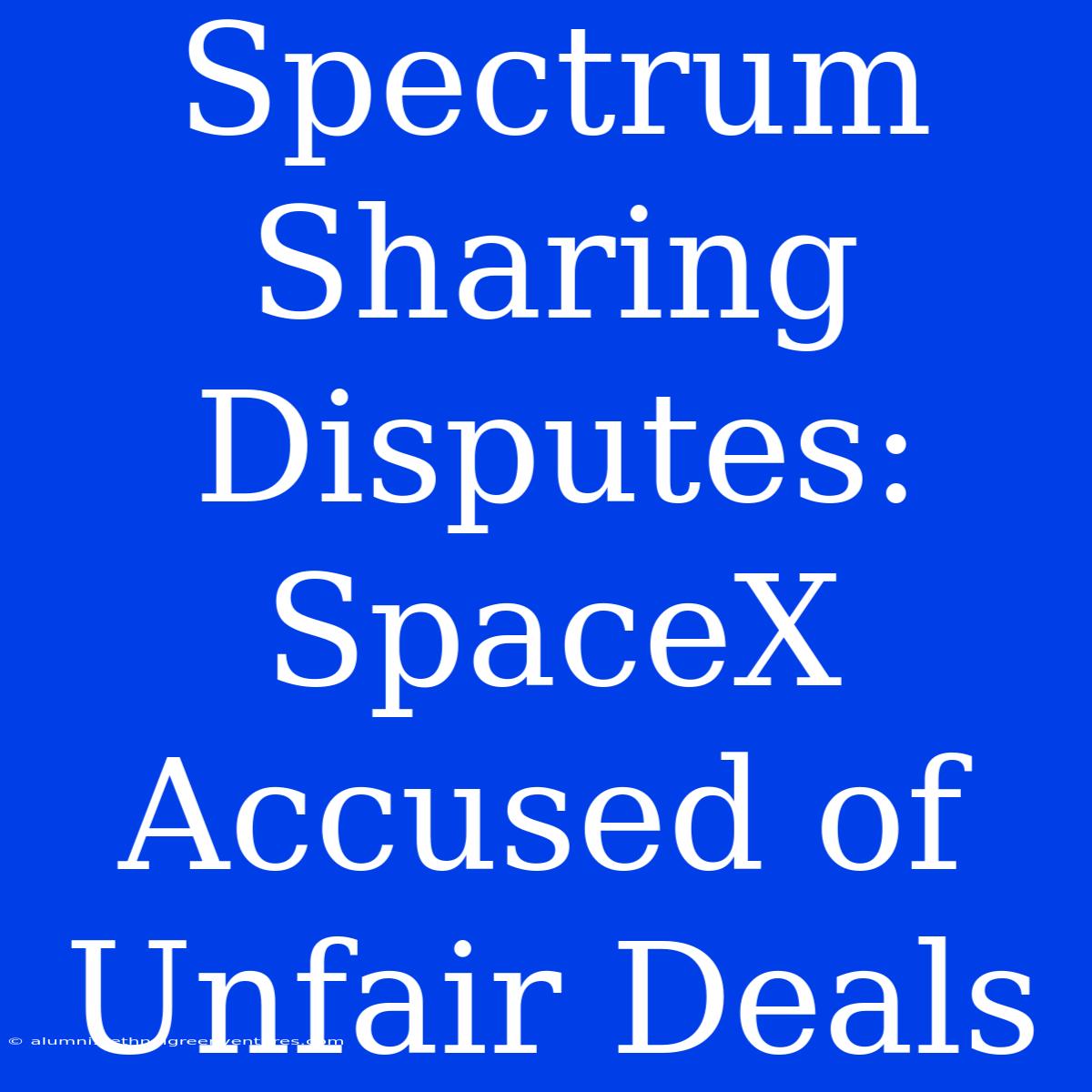Spectrum Sharing Disputes: SpaceX Accused of Unfair Deals
Are SpaceX's spectrum sharing agreements fair, or are they exploiting smaller companies? The fierce competition for valuable spectrum is causing tensions, and SpaceX is at the center of the storm. This article will delve into the intricacies of spectrum sharing disputes, highlighting the accusations against SpaceX.
Editor Note: This is a hot topic because access to spectrum is crucial for communication technology advancement and innovation. Companies like SpaceX are pushing the boundaries of space exploration and broadband services, but their approach to sharing the spectrum is raising concerns about potential unfair advantages and stifled competition.
This article will examine the spectrum sharing disputes surrounding SpaceX, exploring key concerns, arguments, and implications for the future of communication technology. We'll also delve into relevant keywords like spectrum sharing, 5G, Starlink, FCC, and broadband access.
Analysis: We analyzed FCC filings, legal documents, and expert opinions to provide a comprehensive and unbiased overview of these disputes. Our goal is to present both sides of the argument, highlighting potential concerns and benefits of spectrum sharing.
Key Takeaways of Spectrum Sharing Disputes:
| Takeaway | Explanation |
|---|---|
| Spectrum is a scarce resource | Limited spectrum availability leads to fierce competition and necessitates careful allocation and sharing agreements. |
| Sharing agreements must be fair and equitable | Protecting the interests of all players and promoting innovation and competition is essential. |
| SpaceX is accused of exploiting smaller companies | SpaceX's agreements with the FCC are raising concerns about unfair advantages and potential market domination. |
| Spectrum sharing can enable technological advancements | Enabling new services like broadband access, 5G, and satellite internet, but requires careful consideration of potential downsides. |
Spectrum Sharing
Spectrum sharing is a critical aspect of managing the limited radio spectrum resource. Sharing agreements allow various users to utilize the same frequency band, maximizing spectrum utilization.
Key Aspects of Spectrum Sharing:
- Shared Access: Multiple entities utilize the same spectrum simultaneously.
- Frequency Allocation: Regulators like the FCC allocate spectrum bands to specific services.
- Technology Compatibility: Ensuring technology compatibility to avoid interference and ensure effective communication.
- Fairness and Equity: Sharing arrangements should be fair and equitable to all participants.
SpaceX Spectrum Sharing Disputes:
Introduction: The primary concern surrounding SpaceX's spectrum sharing agreements revolves around potential unfair advantages and market dominance. While SpaceX's Starlink satellite internet service promises groundbreaking broadband access, accusations of exploiting smaller companies and jeopardizing competition persist.
Key Aspects:
- FCC Spectrum Licenses: SpaceX has secured licenses for a significant portion of the spectrum, raising concerns about potential market dominance and limiting opportunities for competitors.
- Starlink Deployment: The rapid expansion of Starlink's satellite network has generated concerns about potential interference with existing services, impacting smaller satellite operators.
- Sharing Agreements: Critics argue that SpaceX's sharing agreements with the FCC prioritize its own interests, favoring Starlink over other services.
Further Analysis: Some argue that SpaceX's aggressive expansion and spectrum acquisition are necessary to accelerate the deployment of its broadband services and bridge the digital divide. Others counter that SpaceX's actions could create an uneven playing field, hindering innovation and limiting access to spectrum for other companies, ultimately stifling competition.
Closing: The spectrum sharing disputes involving SpaceX highlight the complexities of managing valuable spectrum resources and the delicate balance between fostering innovation and ensuring fair competition. The outcome of these disputes will have significant implications for the future of communication technology, particularly broadband access, and the potential impact on the competitiveness of the technology sector.
FAQs by Spectrum Sharing Disputes
Introduction: This section addresses frequently asked questions about spectrum sharing disputes surrounding SpaceX.
Questions:
- What is spectrum sharing? Spectrum sharing is a method of allocating radio spectrum resources to multiple users, maximizing utilization.
- Why is spectrum sharing important? Sharing spectrum allows various services to coexist, enabling technological advancements like 5G and satellite internet.
- Why are there disputes around SpaceX's spectrum sharing? Concerns include potential unfair advantages and market dominance by SpaceX, potentially hindering competition and innovation.
- What are the potential benefits of spectrum sharing? Sharing enables the deployment of new services like broadband access and 5G, while promoting technological innovation.
- What are the potential risks of spectrum sharing? Unfair agreements can create an uneven playing field, stifling innovation and potentially leading to market monopolies.
- What is the FCC's role in spectrum sharing? The FCC regulates spectrum allocation and ensures fair and equitable sharing agreements.
Summary: The spectrum sharing disputes surrounding SpaceX raise critical questions about fairness, competition, and the future of communication technologies. Finding a balance between promoting innovation and protecting smaller companies is crucial to ensure a vibrant and diverse technology ecosystem.
Tips for Spectrum Sharing
Introduction: Navigating the complex landscape of spectrum sharing requires careful planning and understanding. Here are some tips for navigating the spectrum sharing environment:
Tips:
- Thorough Research: Understand the current spectrum allocation and regulations.
- Develop Effective Sharing Plans: Clearly define shared access terms, technology compatibility, and monitoring mechanisms.
- Seek Expert Guidance: Engage with legal professionals and spectrum experts to navigate regulatory requirements.
- Collaborate with Other Stakeholders: Building relationships with other spectrum users can foster collaborative solutions.
- Advocate for Fair Practices: Promote transparency, fairness, and equitable access to spectrum resources.
Summary: Navigating the complexities of spectrum sharing requires careful planning, informed decision-making, and a commitment to fairness and equity.
Conclusion: The ongoing spectrum sharing disputes involving SpaceX underscore the critical need for a balanced and responsible approach to managing this valuable resource. Finding equitable solutions that promote innovation while safeguarding competition is paramount to ensuring a thriving and diverse technology ecosystem.
